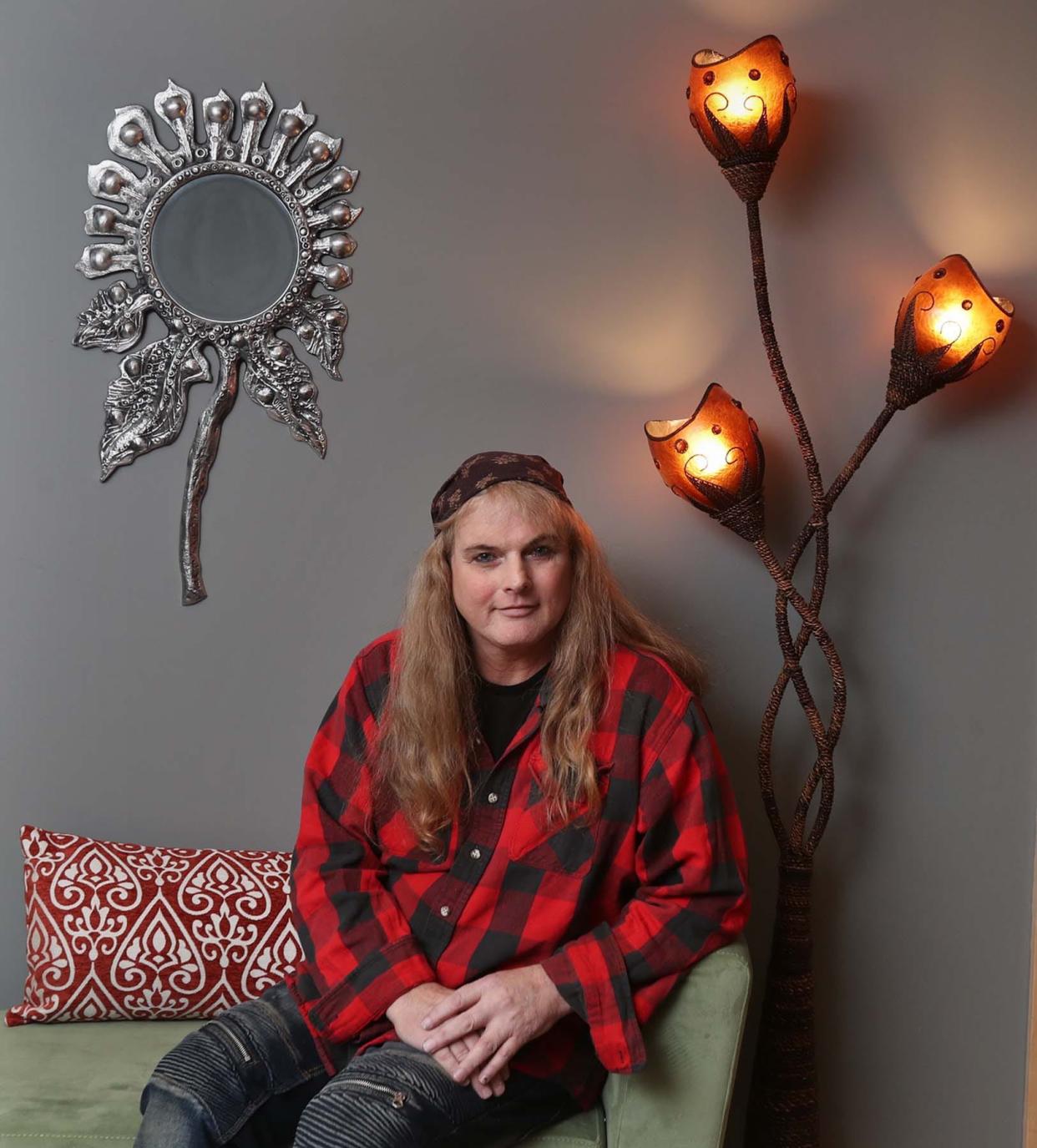‘It made such a difference in my life’: Clinics, employers embracing gender-affirming care

Julie Boylen remembers the day she finally found a doctor who could help her.
It was 2014, and she was on the floor of MetroHealth's Pride Clinic, a Cleveland-based medical office offering health care tailored to the LGBTQ+ community, including transgender patients like Boylen.
“I remember the lady telling me: ‘It's going to be OK. We can help you out here. We've got everything you're going to need,’ ” she said. “I broke down and cried on that floor. I did.”
Even now, eight years later, the memory brings tears to her eyes as she struggles to find the right words.
“It was a moment I needed so bad and it made such a difference in my life.”
In less than a decade since, gender-affirming care has expanded in the region with not only increased medical access, but also more employers insuring medications, therapy and surgery for the trans community.
But transgender individuals seeking medical care still have plenty of obstacles to face when it comes to navigating the health care system.
Boylen came out as transgender when she was 28. It was 2009, and it had been a long road for her to accept herself, spending years in the closet and attempting to change her identity through religion and other methods.
“It was really hard,” she recalled. “But I finally felt free.”
She was seeing a therapist at the time to help her work through past trauma and suicide ideation that 82% of the transgender population deals with, but was feeling misunderstood.
“They were trying,” Boylen said. “[At the time,] most of the therapists didn't know anything about being transgender. They were trying to help with symptoms of this or that.”
And if finding the right therapist was hard, she could forget about gender-affirming health care options like hormone injections or surgeries.
“When I first came out, there was a desert for transgender care and medicine,” she said. “We're talking a serious desert. There was no such thing.”
When she began hormone treatment in 2014 through MetroHealth's LGBTQI+ Pride Network, which at the time was one of the only health care systems in Northeast Ohio for people in her community, she felt a rush of emotions: relief, happiness, excitement. Like many trans individuals seeking physical transitions, she began hormone therapy, a regularly administered injection of estrogen.
“I kind of blossomed,” she said. “I realized I can be okay and survive all this.”
How has Akron’s gender-affirming care landscape grown in the last decade?
Akron’s Summa Health opened the doors to its Pride Clinic in 2019. The same year, Akron Children’s Hospital launched its clinic for gender diverse youths. It was a major win for much of the city’s trans population, who would have to otherwise leave Akron and travel to Cleveland or farther to seek medical treatment, or avoid care altogether.
Studies show that gender-diverse individuals often avoid preventative appointments and push off seeking needed medical care out of fear of discrimination. As a result, they tend to have higher rates of chronic conditions like heart disease and diabetes, said Dr. Crystal Cole, director of Akron Children’s Center for Gender Affirming Medicine.
“Even if I don’t out myself, [doctors are] going to see it on my pharmacy records,” said Em, a 40-year-old trans person using he/they pronouns. They did not want to use their full name out of safety concerns. “I’ve had to go to an ER a few times over the last few years, and my fear walking in is I’m going to be immediately pegged and some doctor who’s not comfortable treating me or it’s against his religion or whatever is going to let me die or something equally bad because he doesn't agree with me.”
A clinic dedicated to treating gender diverse patients can mitigate those fears and offer a safe space where trans people know they’ll be accepted and treated as any other patient.
“The doctor who walked me through the process was very nice and not judgmental,” said Dolli Moody, a 20-year-old trans woman living in Akron's Sherbondy Hill neighborhood. Moody goes to Summa's Pride Clinic located at Chapel Hill for her care.
“They were really understanding and such a delight,” she said. “I actually cried my first time going.”

As the field continues to evolve, health care systems and insurers alike need to be prepared and open to address the specific needs of trans communities, said Akron Children’s Cole.
“More and more people have become more comfortable with expressing their gender diversity than in previous years,” Cole said. “All health care providers need to be adaptive and respectful of that.”
Though gender-affirming care typically applies to treatment options for people seeking physical transitions, Cole said any medical practitioner can and should offer gender affirmation while working with patients, such as using a patient’s correct name and pronouns and avoiding insensitive questions.
More employers offering insurance to cover care costs
Workplaces and insurance providers also are expanding their coverage to be inclusive of gender diverse patients.
When the Akron Children’s Center for Gender Affirming Medicine opened in 2019, Cole said it was challenging for many families to pay for treatments, which often were not covered by insurance.

But in just three years, Cole said, now it’s almost uncommon for insurance companies to deny claims for gender-affirming medicines.
“My experience with insurance was not difficult at all,” said Beau Shaniuk, a 24-year-old trans man living in East Akron. Shaniuk self-administers biweekly testosterone injections and has also had top surgery, which in the case of a trans man, removes breast tissue to create a masculine chest. That procedure was covered under his parents’ insurance policy at the time.

At the time they began hormone treatment, Moody, Boylen and Em were all on Medicaid, a federal and state program that assists with health care costs for people with limited income. Each one of their plans paid for all or part of the costs of hormone injections, which Cole said are relatively inexpensive, ranging from about $10 to $85 per month, depending on the drug used.
“The medicine I’m taking, it makes me more sure of myself,” Moody said. “Me living my truth and being the woman I’ve always wanted to be has helped me work through problems and take my time growing into who I am.”
Some of Akron’s major employers also are providing coverage for gender-affirming medicine. In July 2021, the city expanded its health care coverage to include gender-affirming care for transgender employees and dependents, joining the cities of Columbus, Cincinnati, Toledo and Dayton.
For several years, the city offered hormonal therapy benefits for its insured employees and dependents, but the new policy included coverage of surgical treatments, a move Akron Mayor Dan Horrigan said would help create equity and inclusiveness.
Goodyear Tire & Rubber Co. was listed in the Human Rights Campaign’s 2020 Corporate Equality Index as among the best employers for LGBTQ+ people that include at least one transgender-inclusive health care coverage plan.
“Employers have been looking at those options for individuals, even if they don’t have transgender employees currently, who’s to say they won’t in the future?” said Yvette Lee, a human resources knowledge adviser at Society for Human Resources Management. “The last thing an employer would want is to be caught behind the eight ball in regards to being progressive and inclusive.”
What obstacles threaten or complicate gender-affirming care?
While some employers oppose offering coverage because of religious or personal beliefs, Lee said logistical complications are much more common.
For example, she said, some states have bans on transgender surgeries, particularly for minors.
While employers locally and nationally work to make policies more inclusive, policies like the city of Akron’s health care plan could be in jeopardy as legislation works its way through the statehouse.
Another challenge Lee said she and other HR professionals are seeing is that employers do not fully understand “confusing” language or legalese in their chosen plans, so a plan may be more restrictive than employers initially thought.
Trans patients still face medical discrimination
Aside from potential legislative and insurance difficulties, the medical field itself poses some threats for gender diverse-patients. Even as more clinics pop up to accommodate LGBTQ+ populations, discrimination in traditional medical spaces and other logistical problems work against transgender people.
Em has been in desperate need of a hysterectomy for nearly six months. Following a uterine ablation, they were told that they needed an emergency hysterectomy.
But in Em’s follow-up visit a few days later, their doctor said he was uncomfortable doing the procedure because of their “unique anatomy.”
The situation baffled Em, who has not had bottom surgery to alter their genitals. Though they are taking testosterone, the hormone does not affect the anatomy of their uterus, the organ upon which the procedure would be operated.
“It’s incredibly frustrating,” Em said. “In anyone else’s situation, they would be scheduled for emergency surgery and get it done. But because I’m trans, I’m having to wait for a doctor who is willing to work on me.”
Em’s situation is not uncommon within the transgender community: 29% say their health care provider refused to see them because of their gender identity.
For Em, the refusal to provide treatment means they’re left to grapple with serious repercussions, including “severe and constant” cramping and bleeding that has not subsided since the ablation in February.
For months, they've been seeking other doctors willing to operate on them. They found a gynecologist who will accommodate them, one who they say is the only provider within their health care system willing to do so, but appointments are booked up months in advance.
“I’m in a lot of pain,” Em said. “It just feels like there’s nothing out there to help me.”
Long waitlists, medical costs still a burden to some
Lengthy waitlists are frequently an issue for transgender patients seeking care.
When Shaniuk began seeking hormone therapy in 2019, it took several months to begin treatment. He was living in Athens, Ohio, at the time, where he said there was only one physician in the region specifically working in transgender care.
When the time came for his top surgery, he waited about six months. In the end, he said, it was well worth the wait, recalling the feelings of excitement and validation of his gender identity.

Now, as he continues hormone therapy, which is typically a lifelong commitment, Shaniuk is facing a new obstacle: being kicked off his parents’ insurance.
His family has not been supportive of his identity, he said, and they have not had contact for about a year. When his prescription was rejected by insurance earlier this year, he found out that they had removed him from their policy without warning.
He is now uninsured as he prepares to enter his doctoral program at Kent State, and the added burden of paying full price for his hormones — about $50 per month — and figuring out how to get his prescription at all has created challenges in his life.
“I'm still having difficulties to this day like getting it because of the fact that for whatever reason the refill process has been confusing for everyone,” he said.
Despite the continued obstacles, transgender patients are pleased with the progress that's been made in gender-affirming care in recent years.
Boylen likes to reflect on her journey and acknowledge how far medical infrastructure has come for transgender patients.
"It was 2014, and I was still showing up at doctor's offices and they're saying, 'No, we don't do that,'" Boylen said. "I was looking at closed doors. ... It was heart wrenching... But now young people are realizing who they are sooner and living in a world that is opening up to them. It's great."
Reporter Abbey Marshall is a corps member with Report for America, a national service program that places journalists into local newsrooms. Learn more at reportforamerica.org. Contact her at at amarshall1@gannett.com.
This article originally appeared on Akron Beacon Journal: Akron-area clinics, employers expand care options for trans patients

